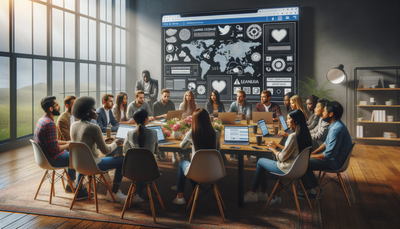The Future of Web Design: AI and Machine Learning
The future of web design is being revolutionized by artificial intelligence and machine learning technologies. These advancements are transforming the way designers approach their craft, offering unprecedented tools and capabilities. From AI-powered design assistants to personalized user experiences, the landscape of web design is evolving rapidly. This article explores the cutting-edge developments in AI and machine learning within the web design industry, examining how these technologies are enhancing creativity, streamlining workflows, and reshaping the user experience. We'll delve into the latest AI-driven design tools, innovative personalization techniques, and the potential impact on the overall design process, providing insights into what lies ahead for web designers and developers.Table of Contents:

AI-Powered Design Tools: Enhancing Creativity and Efficiency
Artificial intelligence is revolutionizing web design through sophisticated tools that augment human creativity and streamline workflows. AI-powered design assistants can now generate layout suggestions, color palettes, and even entire website mockups based on user inputs and preferences. These tools analyze vast amounts of design data to offer intelligent recommendations, helping designers overcome creative blocks and explore new possibilities.Moreover, AI algorithms can automate repetitive tasks such as image resizing, content formatting, and responsive design adjustments, allowing designers to focus on higher-level creative decisions. As these tools continue to evolve, we can expect even more advanced features, such as voice-controlled design interfaces and AI-generated custom illustrations, further enhancing the design process and pushing the boundaries of creativity.
Do you need a website? Want to build a website but don't know where to start? Our website builder is the perfect solution. Easy to use, and with the ability to customize to fit your business needs, you can have a professional website in no time.
Personalization at Scale: Tailoring User Experiences
Machine learning algorithms are enabling web designers to create highly personalized user experiences at scale. By analyzing user behavior, preferences, and demographics, AI can dynamically adjust website content, layout, and functionality to cater to individual visitors. This level of personalization goes beyond simple A/B testing, allowing for real-time modifications that enhance user engagement and conversion rates.For example, AI can customize product recommendations, adjust color schemes based on user preferences, or even modify the navigation structure to suit different user personas. As these technologies advance, we can anticipate websites that adapt seamlessly to each user's unique needs and preferences, creating more engaging and effective online experiences for businesses and consumers alike.
Predictive Design: Anticipating User Needs
AI and machine learning are enabling designers to adopt a more proactive approach through predictive design. By analyzing vast amounts of user data and behavior patterns, AI algorithms can anticipate user needs and preferences before they are explicitly expressed. This capability allows designers to create intuitive interfaces and user flows that guide visitors effortlessly towards their goals.Predictive design can manifest in various ways, such as suggesting relevant content based on browsing history, pre-filling forms with likely information, or adjusting the user interface to accommodate predicted actions. As these predictive capabilities become more sophisticated, we can expect websites that feel increasingly intuitive and personalized, enhancing user satisfaction and engagement across diverse online platforms.
Building a website with SITE123 is easy
Automated Accessibility: Ensuring Inclusive Design
One of the most promising applications of AI in web design is in the realm of accessibility. Machine learning algorithms can automatically analyze websites for accessibility issues, suggesting improvements to ensure compliance with WCAG guidelines and other accessibility standards. These tools can detect issues such as low contrast ratios, missing alt text, and keyboard navigation problems, providing designers with actionable insights to create more inclusive websites.Furthermore, AI can assist in real-time accessibility adjustments, such as automatically generating captions for videos or providing text-to-speech functionality for written content. As these technologies evolve, we can anticipate a future where web accessibility becomes more seamlessly integrated into the design process, making the internet a more inclusive space for all users.
The Changing Role of Web Designers
As AI and machine learning technologies continue to advance, the role of web designers is likely to evolve. Rather than replacing human designers, these technologies will serve as powerful tools that augment creativity and streamline workflows. Designers will need to adapt their skills to effectively leverage AI-powered tools, focusing more on strategic thinking, user experience planning, and creative direction.The future may see designers taking on roles that blend traditional design skills with data analysis and AI management. They'll need to understand how to train AI models, interpret machine learning insights, and make informed decisions based on AI-generated recommendations. This shift will likely lead to new job titles and specializations within the field of web design, as the industry adapts to harness the full potential of AI and machine learning technologies.





